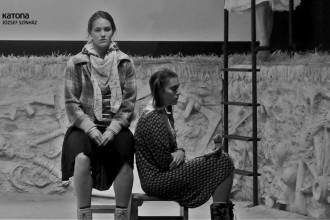‘Leaving the Atocha Station’ and the art of not quite saying what you mean
For Tao Lin, Ben Lerner’s novel ‘Leaving the Atocha Station’ (2011) exists as a ‘concisely definitive study of the “actual†versus the “virtual†as applied to relationships, language, poetry, [and] experience’. Adam Gordon — Lerner’s untrustworthy alter-ego — cannot escape this mode of thinking, or of experiencing. The novel’s opening pages relate an encounter with Van der Weyden’s ‘Descent from the Cross’ in the Museo del Prado, Madrid. ‘I was interested in the disconnect between my experience of actual artworks and the claims made on their behalf,’ Adam suggests, immediately concerned by the emotional response of a man seemingly undergoing ‘a profound experience of art’ at the foot of the painting:
I had long worried that I was incapable of having a profound experience of art and I had trouble believing that anyone had, at least anyone I knew. I was intensely suspicious of people who claimed a poem or painting or piece of music “changed their life,†especially since I had often known these people before and after their experience and could register no change.
Adam cannot align his own experience of the painting to that of the stranger’s. The transcendent, ‘virtual’ appreciation of art evades him — if, as he wonders, it exists at all. Indeed, ‘the closest I’d come to having a profound experience of art,’ he continues, ‘was probably the experience of this distance, a profound experience of the absence of profundity’.
[Grossman] describes what he calls “virtual†poetry. Poems are virtual for Grossman because there is an unbridgeable gap between what the poet wants the poem to do and what it can actually do…[P]oetry issues from the desire to get beyond the human, the finite, the historical, and to reach the transcendent or divine. But as soon as the poet moves from the poetic impulse to the actual poem, the song of the infinite is compromised by the finitude of its terms.
This necessary failure, for Lerner and for Gordon, creates a void between the reception of the art and the art itself. ‘[P]oems would constitute screens on which readers could project their own desperate belief in the possibility of poetic experience…or afford them the opportunity to mourn its impossibility’. Poems are ‘pure potentiality, awaiting articulation’. This belief engenders a kind of negative experience, whereby emotion is inherently related to the potential of an artwork as opposed to its physical realization. Negative experience of this sort necessitates a continual adherence to the virtual. Indeed, Adam exerts a constant, corresponding impulse towards interpretation, relentlessly demanding an answer to the question “What does this mean?†or, more acutely, “What might this mean?â€
It is, in part, from John Ashbery that Adam comes to recognize this distance, both in his art and his personal life. ‘Ashbery’s flowing sentences always felt as if they were making sense, but when you looked up from the page, it was impossible to say what sense had been made,’ he suggests before reading lines from ‘Clepsydra’. The process of reading Ashbery, for Adam, presents a singular profundity, ‘as though the actual…poem were concealed from you, written on the other side of a mirrored surface, and you saw only the reflection of your reading,’ an experience of your experience ‘that keeps the virtual possibilities of poetry intact because the true poem remains beyond you’. Lerner’s discussion of this humiliating process is contained in his own essay on the poet, ‘The Future Continuous: Ashbery’s Lyric Mediacy’ (boundary 2, 2010). An accomplished poet himself, with three equally demanding collections of verse, Lerner reflects that ‘I wanted to take these ideas about poetry and the arts and…track their effects once they were placed in a particular body, mind, and time’.




